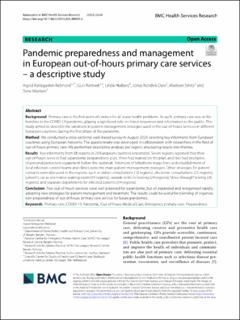| dc.contributor.author | Rebnord, Ingrid Keilegavlen | |
| dc.contributor.author | Rørtveit, Guri | |
| dc.contributor.author | Huibers, Linda | |
| dc.contributor.author | Dale, Jonas Nordvik | |
| dc.contributor.author | Smits, Marleen | |
| dc.contributor.author | Morken, Tone | |
| dc.date.accessioned | 2023-09-05T09:19:27Z | |
| dc.date.available | 2023-09-05T09:19:27Z | |
| dc.date.created | 2023-04-18T10:57:51Z | |
| dc.date.issued | 2023-01-19 | |
| dc.identifier.issn | 1472-6963 | |
| dc.identifier.uri | https://hdl.handle.net/11250/3087434 | |
| dc.description.abstract | Background: Primary care is the first point of contact for all acute health problems. As such, primary care was at the frontline in the COVID-19 pandemic, playing a significant role in clinical responses and information to the public. This study aimed to describe the variations in patient management strategies used in the out-of-hours services in different European countries during the first phase of the pandemic.
Method: We conducted a cross-sectional web-based survey in August 2020, selecting key informants from European countries using European networks. The questionnaire was developed in collaboration with researchers in the field of out-of-hours primary care. We performed descriptive analyses per region, structuring results into themes.
Results: Key informants from 38 regions in 20 European countries responded. Seven regions reported that their out-of-hours services had a pandemic preparedness plan, three had trained on the plan, and two had stockpiles of personal protection equipment before the outbreak. Extension of telephone triage lines and establishment of local infection-control teams and clinics were the main patient management strategies. Other strategies for patient contacts were also used in the regions, such as video-consultations (13 regions), electronic consultations (21 regions), patient’s car as alternative waiting room (19 regions), outside tents for testing (24 regions), “drive-through” testing (26 regions), and separate departments for infected patients (14 regions).
Conclusion: Few out-of-hours services were well prepared for a pandemic, but all expanded and reorganized rapidly, adopting new strategies for patient management and treatment. The results could be useful for planning of organization preparedness of out-of-hours primary care service for future pandemics. | en_US |
| dc.language.iso | eng | en_US |
| dc.publisher | BMC | en_US |
| dc.rights | Navngivelse 4.0 Internasjonal | * |
| dc.rights.uri | http://creativecommons.org/licenses/by/4.0/deed.no | * |
| dc.title | Pandemic preparedness and management in European out-of-hours primary care services – a descriptive study | en_US |
| dc.type | Journal article | en_US |
| dc.type | Peer reviewed | en_US |
| dc.description.version | publishedVersion | en_US |
| dc.rights.holder | Copyright 2023 the authors | en_US |
| dc.source.articlenumber | 54 | en_US |
| cristin.ispublished | true | |
| cristin.fulltext | original | |
| cristin.qualitycode | 2 | |
| dc.identifier.doi | 10.1186/s12913-023-09059-6 | |
| dc.identifier.cristin | 2141541 | |
| dc.source.journal | BMC Health Services Research | en_US |
| dc.identifier.citation | BMC Health Services Research. 2023, 23, 54. | en_US |
| dc.source.volume | 23 | en_US |

